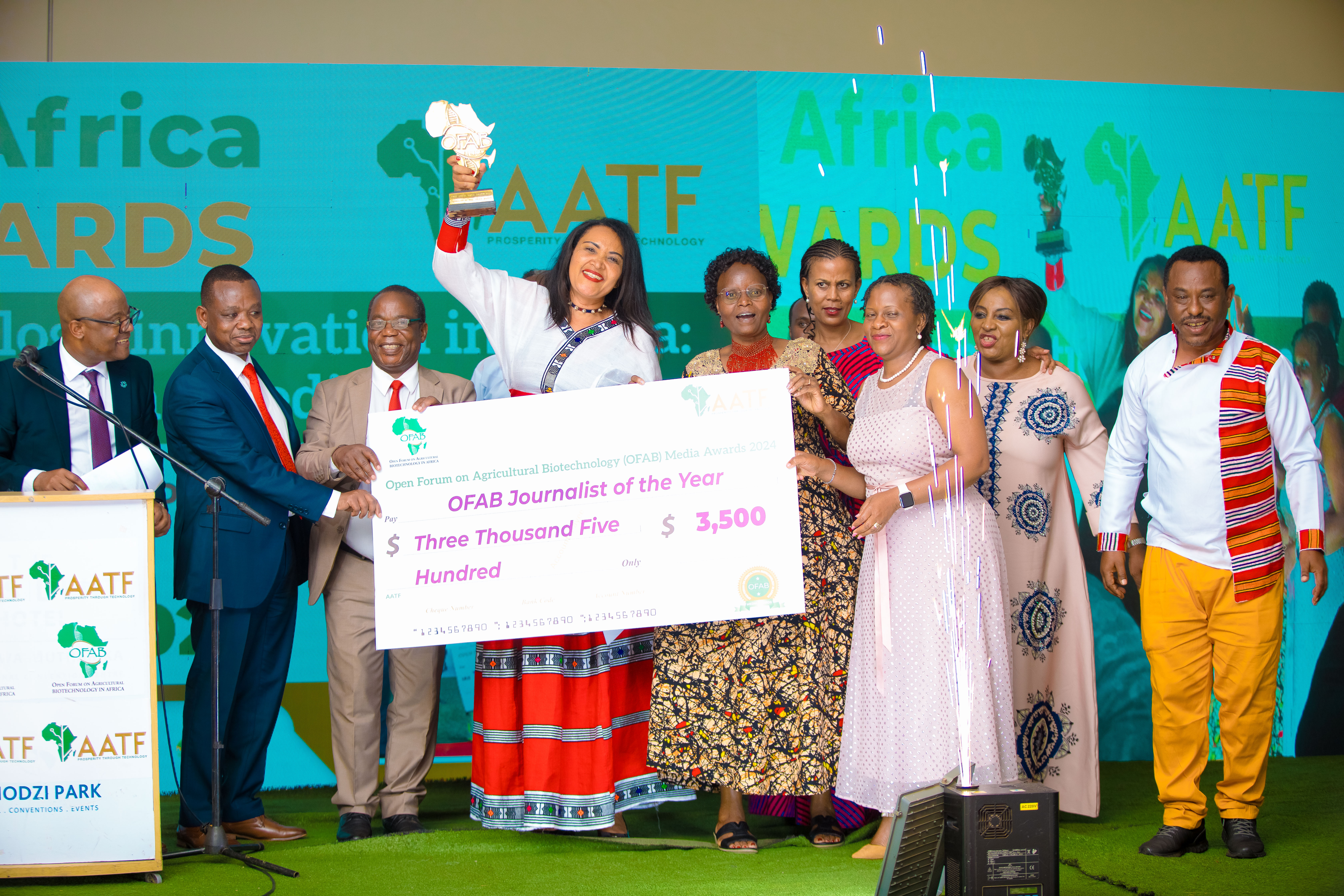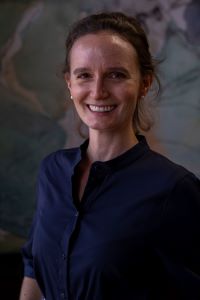
A television journalist from Ethiopian Broadcasting Corporation (EBC), Chaltu Gololcha Miessa, is the 2024 OFAB Africa Journalist of the Year winner.
She was declared the overall winner at the 2024 Open Forum on Agricultural Biotechnology in Africa (OFAB) Media Awards held on 13 December 2024 in Lilongwe, Malawi. Additionally, her submission won first place in the TV news reporting category.
Chaltu emerged victorious among 27 finalists from nine OFAB countries across Africa, including Kenya, Tanzania, Ethiopia, Ghana, Malawi, Nigeria, Rwanda, Mozambique, and Burkina Faso.
Growing up as the child of farmers, Chaltu experienced firsthand the challenges of conventional agriculture and these encounters inspired her reporting on innovative agricultural solutions, such as tissue culture technology and artificial insemination that could boost output and raise local farmers’ standard of living.
“Despite my parents’ hard work, conventional farming methods often yielded limited results, leaving us struggling,” Chaltu said.
Her coverage highlights transformative technologies that can alleviate farmers’ burdens and increase their prosperity. She finds hope in Ethiopia’s agricultural modernization initiatives, which align with her aspiration to contribute to sustainable development and social change.
Peter Mugambi, Director of Corporate Services at AATF, who represented the AATF Executive Director at the event, acknowledged the importance of the OMAs in promoting innovations in African agriculture through accurate and outstanding media coverage. “Through their responsible, professional, ethical, and impactful reporting, journalists help foster constructive dialogue on modern biotechnology, a field of immense importance for the future of agriculture and food security in Africa,” he said.
By engaging with experts, policymakers, and communities, journalists have clarified complicated subjects and empowered audiences to form informed opinions, Mugambi reflected.
“Journalists are pivotal in facilitating social change, shaping public opinion, and promoting informed decision-making. The media’s role extends beyond educating and informing; it amplifies marginalized voices, highlights critical issues, and shapes societal agendas,” Mugambi added. “Your reporting bridges the gap between scientific innovation and public perception. By providing balanced and accurate coverage, you empower citizens to make informed choices about the food they consume and the technologies that underpin agricultural transformation.”
The ceremony also coincided with the release of a report titled “Genetically Modified Crops in Kenya: The Cost of Delay,” authored by Breakthrough Institute, Alliance for Science, AATF, ISAAA, and the International Potato Center (CIP). The report detailed the significant financial losses incurred from delaying and denying farmers access to improved seeds. In Kenya alone, the five-year delay in approving Bt cotton, Bt maize, and late blight disease-resistant potato is estimated to have cost farmers and consumers $157 million.
Mr. Kawanga, Chairperson of the Board of Commissioners for the National Commission for Science and Technology (NCST) in Malawi, noted that Malawi is among the few African countries advancing in biotechnology research, which has the potential to improve the quality of life and create job opportunities. “There is global interest in the impact of biotechnology on food security, health benefits, and environmental preservation. Malawi has embraced biotechnology by developing an inclusive biotechnology policy and a biosafety framework,” he said.
Dr. Margaret Karembu, Director of ISAAA AfriCenter and OFAB Kenya Chair, delivered a keynote address emphasizing the role of digital transformation in sharing information and combating misinformation. “Misinformation fueled by digital transformation not only affects public perception but also impacts the growth of sectors like biotechnology, particularly in Africa,” she noted. Karembu stressed the importance of decisive action in embracing biotechnology to ensure the continent’s agricultural productivity and sustainability.
Vitumbiko Chinoko, OFAB Project Manager, acknowledged the impact of misinformation on investment in research and development in the biotechnology sector. “We understood the cost of delays but lacked consolidated numbers until the report provided them. Most African countries are heavily reliant on imports rather than growing their own capacities,” he said.
Speaking on behalf of the judges at the awards ceremony, Ochieng’ Ogodo, a Kenyan-based consulting science news editor said journalists are expected to always keep an objective mindset as they report their stories.
Journalism is a public service, and journalistic ethics set high standards for fact-checking: “Reporters will be fulfilling the social function of journalism which is to inform, to interpret news, and educate audiences if they adhere to accurate and factual reporting,” he said.
The OMAs, he said, are helping shape news reporting of critical biotechnology issues in Africa. “Recognizing and celebrating journalists who demonstrate innovation, creativity, and can break complex biotechnology issues into easy-to-understand subjects is providing a benchmark for excellence within the African media industry,” he said.
Onche Odeh, a print journalist from Nigeria, won in the print and online category, while Mildrine Sabwami, a radio journalist from Kenya, won in the radio category. The overall winner received $3,500 in prize money, a trophy, an iPhone 16 Pro Max, and a certificate. Each category winner received $1,500, an iPhone 15 Pro Max, and a certificate, while the runners-up received $1,000, an iPhone 15 Pro Max, and a certificate.


















































































